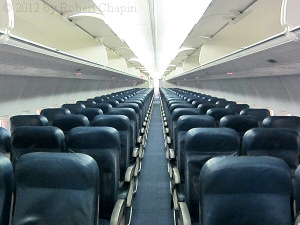
The topic for discussion this week is competition between United States airlines and foreign airlines. Where these businesses simultaneously operate international routes, they create a market for ticket sales, cargo revenue, and the increasingly popular fees for checked baggage, meals, and other amenities. Or, if no U.S. airline is able to operate competitively on a given route, the market supply consists of foreign airlines only.
In June, the Air Line Pilots Association published a set of recommendations for strengthening the position of U.S. airlines among global rivals. First on their list of ideas was reforming U.S. taxes imposed on airlines, or in other words, making the U.S. more like “countries with low or nonexistent tax and regulatory burdens.”
U.S. airlines currently charge a variety of federal air fare taxes directly to passengers. For example, seven of these taxes were described in a recent government report about airline fees. For further reading, see GAO-10-785. It is interesting to note that some of these taxes “are collected by U.S. and foreign airlines.”
One aspect of tax reform could involve flattening or eliminating taxes on international flights. It seems necessary to distinguish these flights because they are the source of direct competition at issue. Ensuring equal taxation of airlines, giving no one the advantage, could resolve the issue of U.S. airlines paying more in taxes for these flights. Yet, that would be an oversimplification. The aim is to improve the position of U.S. airlines, which could mean taxing the foreign airlines at an even higher rate in the U.S.
Taxation of domestic flight is a significantly more thorny issue. Yes, reducing taxes on domestic airline tickets would make the U.S. airlines more competitive in international markets. But in the U.S., most of the aviation infrastructure from airports to air traffic control, navigation facilities, and safety systems are all operated by the government and funded by taxes. To say that airlines should be less burdened by taxation actually translates into a shift of the tax burden on to non-flying tax payers. To put it a third way, reducing taxes on airline tickets would constitute a government subsidy of the airlines and airline passengers. Subsidies make sense in economic terms only to the extent that they promote other sources of revenue or cost savings for the government.
Where the current tax system is unfair or overly complex, reforms should be considered, and adjustments put in place to ensure U.S. businesses are not being penalized in favor of foreign airlines. Healthy U.S. businesses create more jobs, and more jobs mean more job security for existing aviation workers.
3 responses to “Leveling Airline Taxes”
If U.S taxes on international flights interfere with foreign competition, much more than immediate ticket revenue is at risk. Our government should be sufficiently sensitive to the meaning of international competition to stress the market place in the least way possible. Any other move would be myopic and self-defeating.
Your article makes its point well.
I agree that the U.S. should tax foreign airlines at a higher rate than domestic flights. If foreign airlines are able to fly to our country and make a profit, we should also be making a profit from it as well. After all, they will be using our infrastructure, i.e. our airports, air traffic control, etc. I do not believe cutting taxes on domestic flights is a sensible solution. With the loss of millions and possibly billions of dollars, where would that be made up? The non flying public sure wouldn’t want taxes increased on other goods and services to make up for the deficit.
You make a very good point in that reducing taxes domestically would only transfer the burden to non-flying taxpayers. I also agree that the leveling needs to take place on the international flights.